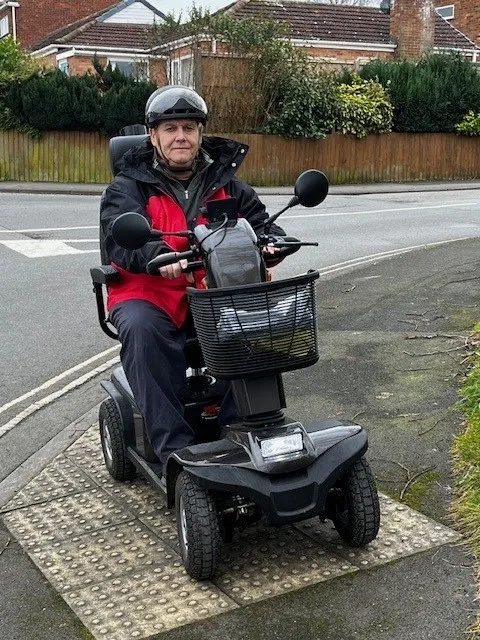
There is concern in the UK over the road safety of mobility scooter users. The insurance intermediary, Surewise, provides cover for many mobility scooter users and has joined forces with charities, mobility retailers and academics to urge the UK Government to act on rising casualties, inadequate infrastructure and the growing tide of hostility and verbal abuse faced by many users.
Despite being legally used by people with disabilities and mobility issues, mobility scooters are often seen as a nuisance.
“People shout at me in the street - telling me I shouldn’t be using a scooter, that there’s nothing wrong with me, or that I’m just lazy,” said Dean Brook (56), from Nuneaton in Warwickshire.
Brook began using a mobility scooter after losing both legs below the knee due to complications from type 2 diabetes and neuropathy. Prior to that Dean was fit and healthy, worked full time and enjoyed playing football.
He added “I’ve lost count of how many times I’ve had to lift my trouser leg to prove to complete strangers that I have prosthetic limbs. It’s humiliating.”
Surewise launched the Safer Mobility Campaign in April 2024 after uncovering a troubling 20% year-on-year rise in serious injuries and deaths involving mobility scooter users over the past decade. In 2023 alone, 16 mobility scooter users were killed in collisions - nearly double the nine fatalities recorded in 2022.
But since launching the campaign, it has become increasingly clear that stigma, social hostility and everyday obstructions pose an equally serious threat to mobility scooter users’ wellbeing and independence as the physical dangers on the roads.
David Dixon (65), from Hampton Magna, Warwick, suffered a major stroke in 2023, leaving him dependent on his mobility scooter to maintain his independence.
He said: “People shout at you on the road to get on the pavement - and on the pavement to get off it. It’s constant.
Richard Hannan, Director of Surewise, said: “These are already vulnerable people, many of whom face serious medical conditions - and yet they’re insulted, ignored, mocked and blocked, simply for trying to live independently.
“This inequality in perception and treatment can no longer be ignored. We need formal recognition, national guidance and visible support to change how mobility scooter users are seen – and to make our streets safer and more inclusive for everyone.”
The call is backed by organisations across the disability, research and retail sectors - including Wheels for Wellbeing, Nottingham Trent University, Warwickshire Road Safety Partnership and Mobility and Lifestyle.
The Safer Mobility campaign is urging the Department for Transport to update the Highway Code to explicitly include mobility scooter users in the “Hierarchy of Road Users” - a framework introduced in 2022 that prioritises the safety of the most vulnerable.
Professor Duncan Guest, Head of Psychology at Nottingham Trent University, is leading a research study into the lived experiences of mobility scooter users.
“Our research shows that after access difficulties, the negative attitude of others to mobility scooter users is the biggest disadvantage experienced by users. They feel they are seen as a nuisance, treated with hostility and looked down on and treated as second-class citizens.
“Given that users are already mobility impaired and vulnerable, it is clear that the way society thinks about and treats mobility scooter users has to change.
“This also needs to go hand in hand with education about safe use of mobility scooters both for users and non-users, so that collectively users of the road and pedestrian areas are better able to understand mobility scooter behaviour.”









